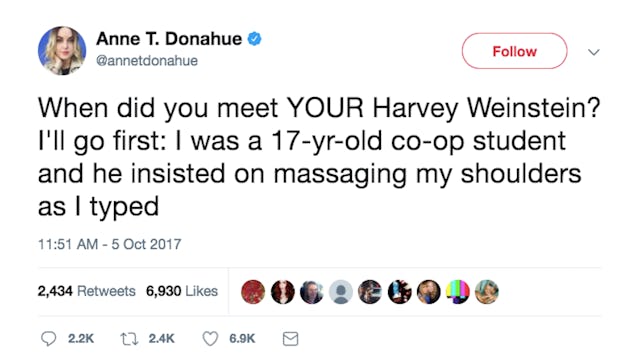Women Share Their Stories Of Workplace Harassment And It’s Infuriating

Writer starts an important discussion about men in power and sexual harassment
Yesterday, the New York Times published a seriously disturbing report covering decades’ worth of sexual harassment and abuse perpetrated by Hollywood producer Harvey Weinstein. Female actors and other Weinstein Company subordinates — who have everything to lose by reporting him — are now speaking out against him. Weinstein and his production company are behind more award-winning movies than we can count, and he’s been one of the most prominent figures in Hollywood for years.
He’s also a serial sexual harasser.
Naturally, the internet was abuzz after the story went live. Not many people were surprised, because that’s how cynical we’ve become about sexual abuse and men in positions of power. But a lot of women felt motivated to share their own experiences of sexual harassment and abuse in the workplace thanks to writer Anne T. Donahue.
“I think it was the familiarity of this story that made me say something,” Donahue tells Scary Mommy. She says she wasn’t at all surprised by the allegations, but reading about them made her angry and she took to Twitter. “I figured at the very least, someone would see that something happened to me, and they would feel a little less alone if something similar happened to them. It turns out a lot of people have had something similar (or worse) happen to them.”
“When did you meet YOUR Harvey Weinstein?” she asked. Because you’d be hard-pressed to find a woman who doesn’t have a Weinstein-like story. This thread proves it.
https://twitter.com/jetpack/status/916025545405501440
And these are just a small fraction of the stories found within the thread. It’s clear women everywhere share universal experiences of sexual harassment in work environments — especially when it comes to male superiors who have a thing for creepy shoulder massages. (What IS it with the goddamn shoulder massages? Jesus. You can actually be a boss and not touch your employees at all, ever.)
I’ve had my own share of inappropriate experiences like these, but the one that stands out to me the most is when I was 16 years old and working as a restaurant hostess. An old teacher of mine I hadn’t seen since I was 13 came in and sat at the bar, grabbed me by the waist as I walked past, and (in one big breath courtesy of Jack Daniels) told me I’d really “filled out nicely in three years” while sliding his hand down my ass. My male manager thought it was funny. I feel nauseated thinking about it, and that’s just one of my own similar moments.
Donahue’s tweet received over 2,000 responses in less than 24 hours. “What stands out to me the most has been the generosity of those sharing,” she says. “I’ve been blown away by how many women and men are sharing their experiences and keeping the conversation alive. That’s massive. I may have tweeted a question and experience, but it’s been everyone responding and sharing and tweeting who’ve turned it into valuable discourse. I’m in awe.”
Following the explosive Times report, Weinstein gave a statement that is equal parts bizarre and pathetic. He blames his age (because of course he does) and the “culture” in which he grew up as justification for his predatory ways. We’ll take a hard pass on that, thanks.
In the wake of this story, and knowing workplace sexual harassment is something that happens to millions of women every single day, we have to stay angry. We have to stop normalizing this criminal behavior.
Donahue says once we “obliterate rape culture once and for all” we’ll stop normalizing sexual harassment. Which is no easy feat, to be sure. “We’re taught by our movies, our TV shows, by families, by friends, by teachers, strangers, the President himself that it’s not the fault of the predator; that the one being targeted was ‘asking for it.’ And it takes a long, long time to un-learn that ideology,” she says.
We can use our voices — via platforms like Twitter as a vehicle — to spread the message and let abusive creeps everywhere know we’re putting them on blast.
“I think this type of conversation is an important step in clapping back — but we still have a long way to go. And tediously, it’s more conversations, more discourse, more self-education, more listening (above all listening), more believing. You un-learn. And that takes a lot of time. But we don’t have a choice anymore.”
This article was originally published on